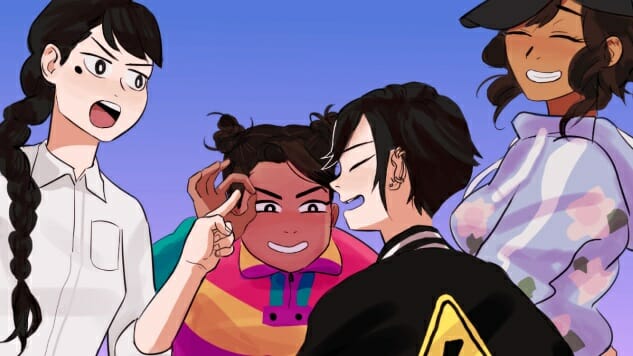Butterfly Soup Is a Necessary and Unabashed Celebration of Queerness
Lead image from Butterfly Soup's Itchi.o page Games Features Butterfly Soup
It’s thankfully easier than ever to find games with queer representation, regardless of whether that representation is good or bad. But if you want to play a game that unabashedly celebrates queerness, has fantastic writing, and is easily accessible regardless of your budget, it can’t get much better than Butterfly Soup, a pay-what-you-want game developed by Brianna Lei.
I’ve had it recommended to me by numerous queer women since its release back in 2018, so I decided to kick off this year’s Pride Month by finally playing it. I don’t regret flooding my pictures folder with screenshots of just about every other line in this game, but I do regret not playing it sooner.
Butterfly Soup centers on Diya, but, like my queer baby self once did, it blooms to tell a grander story. Diya, Min-seo, Akarsha and Noelle are four queer Asian girls who play baseball and like girls. Though you’ll play as Diya for the first half, the game switches between their perspectives so that you get to know these wonderful girls on a more personal level.
Diya is a tall Indian girl who has intense social anxiety that makes her run away upon the sight of an approaching stranger. She likes playing as Luigi in Mario Kart, is great at sports and loves dogs more than she loves most things. Min-seo is a short lesbian who exudes a level of aggression and power that makes up for her lack of height. She’s rebellious and edgy and has a thing for carrying knives in her jacket. Akarsha is a hilarious bi girl who constantly delivers lines I know I’ll be quoting for time to come, such as, “Guys are like communism. They’re good in concept, but in reality they suck.” She loves Mexican food and uses humor to deflect from her boredom and unhappiness. Noelle is always studying, though not always by choice—her parents often seem to care only about her academic performance. She’s hard to watch movies with because she feels the need to point out scientific inaccuracies.
I took the time to contextualize these girls because Butterfly Soup’s writing excels at characterization. From the girls’ different texting styles (Min-seo sends quick and short messages with nary a punctuation in sight, which reflects her vigorous and assertive personality, while the proper Noelle takes the time to send perfectly written full sentences) to their vibrant personalities, the game establishes a level of depth in them in four hours that some other stories fail to accomplish in dozens.
That matters because it’s vital to write marginalized characters as regular people. Sometimes marginalized people are written as if we’re caricatures—as if we’re little else than our marginalized identities, as if we’re walking political statements. And it’s quite silly; we’re all collections of various identities but it’s only marginalized people who are burdened with being reduced to a select few of them. It’s almost as if our identities aren’t inherently political, but are rather merely politicized by those who want the world to belong to and reflect a specific group of people.
Butterfly Soup treats not just queerness, but also conversations about mental health, discrimination and identity as the normal things they are. It doesn’t pretend that its characters inhabit a faux unproblematic world, and yet it also gracefully juxtaposes these things with a pure queer romance. The writing is grounded enough to make you aware that Diya and Min-seo’s relationship won’t be perfect—no real relationship is, and the game establishes the two as believably flawed people. But it doesn’t concern itself with showing that; instead, it’s happy to celebrate coming into one’s own queerness, intimate friendships between women and the development of a healthy and joyful first love.
I love myself some messy queer stories, but I adore something this wholesome just as much. It’s Pride Month, and honestly, I’ve needed this kind of game. I don’t want to hear about “straight pride” parades; I don’t want to give attention to homophobes on Twitter; I don’t want to acknowledge awful, ill-intentioned discourses in the queer community about which sexualities are valid and which aren’t. I want to feel an amplified sense of pride for being my queer self; I want to celebrate queer people similar to and different from me; I want to lift up the people whom mainstream queer narratives tend to ignore.
Butterfly Soup does all these things and so much more. It’s happy to be unabashedly queer, and I can’t help but think about how much I wish I had this game when I was younger. But I’m glad that, at least now, many queer girls will have media like this to seek answers from. They’ll know they don’t have to repress themselves—they can just spread their wings, take pride in being their beautiful queer selves, and fly.
Natalie Flores is a freelance writer who loves to talk about games, K-pop and too many other things at @heartimecia.
